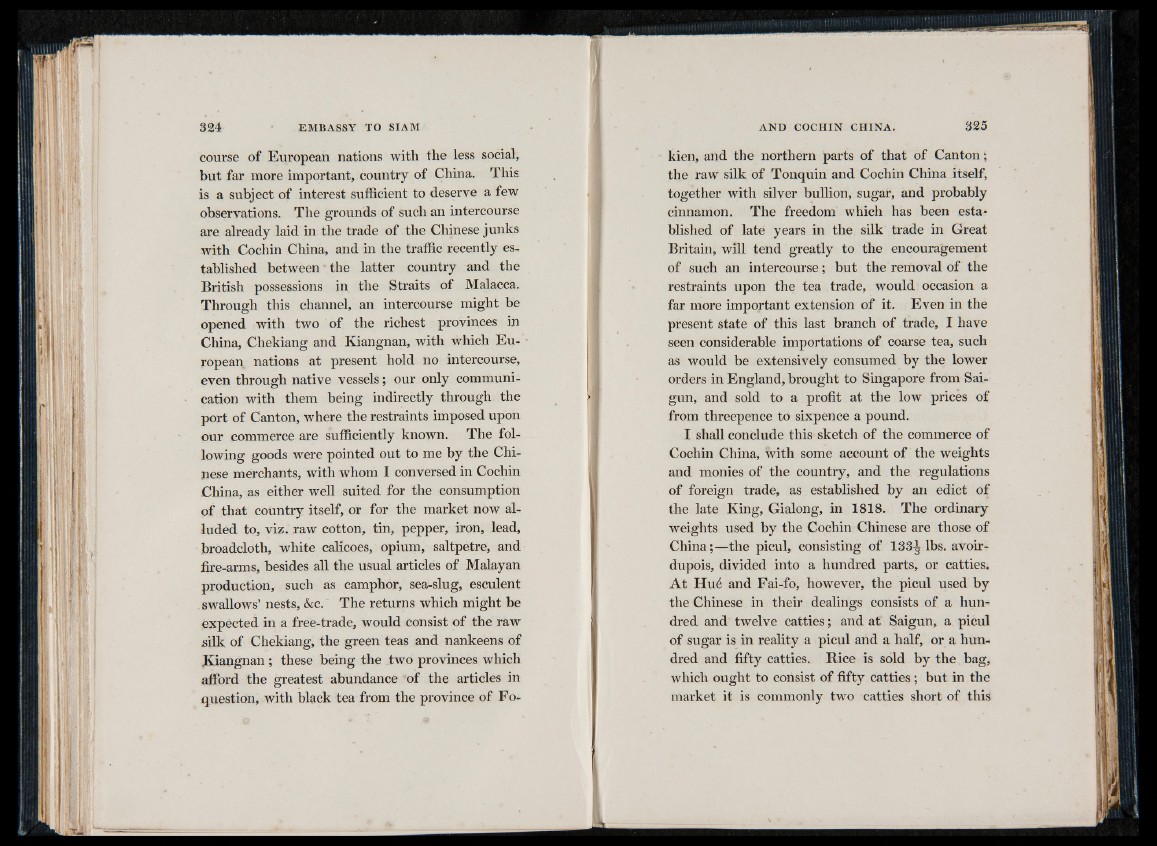
course of European nations with the less social,
but far more important, country of China. This
is a subject of interest sufficient to deserve a few
observations. The grounds of such an intercourse
are already laid in the trade of the Chinese junks
with Cochin China, and in the traffic recently established
between the latter country and the
British possessions in the Straits of Malacca.
Through this channel, an intercourse might be
opened with two of the richest provinces in
China, Chekiang and Kiangnan, with which E u ropean
nations at present hold no intercourse,
even through native vessels; our only communication
with them being indirectly through the
port of Canton, where the restraints imposed upon
our commerce are sufficiently known. The following
goods were pointed out to me by the Chinese
merchants, with whom I conversed in Cochin
China, as either well suited for the consumption
of that country itself, or for the market now alluded
to, viz. raw cotton, tin, pepper, iron, lead,
broadcloth, white calicoes, opium, saltpetre, and
fire-arms, besides all the usual articles of Malayan
production, such as camphor, sea-slug, esculent
swallows’ nests, &c." The returns which might be
expected in a free-trade, would consist of the raw
silk of Chekiang, the green teas and nankeens of
JKiangnan ; these being the two provinces which
afford the greatest abundance of the articles in
question, with black tea from the province of Fokien,
and the northern parts of that of Canton ;
the raw silk of Tonquin and Cochin China itself,
together with silver bullion, sugar, and probably
cinnamon. The freedom which has been esta*
blished of late years in the silk trade in Great
Britain, will tend greatly to the encouragement
of such an intercourse; but the removal of the
restraints upon the tea trade, would occasion a
far more important extension of it. Even in the
present state of this last branch of trade, I have
seen considerable importations of coarse tea, such
as would be extensively consumed by the lower
orders in England, brought to Singapore from Sai-
gun, and sold to a profit at the low prices of
from threepence to sixpence a pound.
I shall conclude this sketch of the commerce of
Cochin China, with some account of the weights
and monies of the country, and the regulations
of foreign trade, as established by an edict of
the late King, Gialong, in 1818. The ordinary
weights used by the Cochin Chinese are those of
China ;—the picul, consisting of 133^ lbs. avoirdupois,
divided into a hundred parts, or catties.
A t Hué and Fai-fo, however, the picul used by
the Chinese in their dealings consists of a hundred
and twelve catties ; and at Saigun, a picul
of sugar is in reality a picul and a half, or a hundred
and fifty catties. Rice is sold by the bag,
which ought to consist of fifty catties ; but in the
market it is commonly two catties short of this